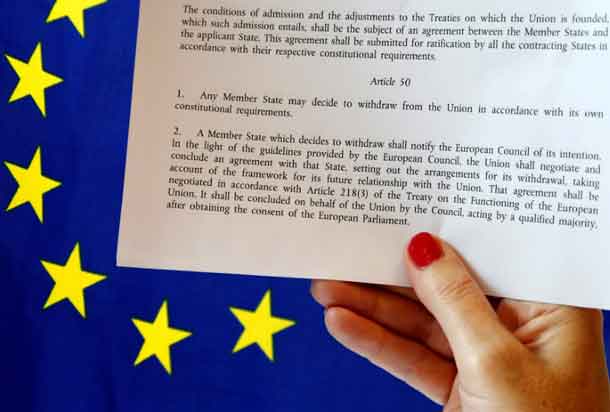
LONDON (Reuters) – Prime Minister Theresa May must get parliament’s approval before she begins Britain’s formal exit from the European Union, the Supreme Court ruled on Tuesday.
The UK’s highest judicial body dismissed the government’s argument that May could simply use executive powers known as “royal prerogative” to invoke Article 50 of the EU’s Lisbon Treaty and begin two years of divorce talks.
Below is some reaction to the judgment:
SPOKESMAN FOR BRITISH PRIME MINISTER THERESA MAY:
“The British people voted to leave the EU, and the government will deliver on their verdict – triggering Article 50, as planned, by the end of March. Today’s ruling does nothing to change that.”
“It’s important to remember that Parliament backed the referendum by a margin of six to one and has already indicated its support for getting on with the process of exit to the timetable we have set out.”
“We respect the Supreme Court’s decision, and will set out our next steps to parliament shortly.”
SPOKESMAN FOR OPPOSITION LABOUR LEADER JEREMY CORBYN:
“Labour respects the result of the referendum and the will of the British people and will not frustrate the process for invoking Article 50.
“However, Labour will seek to amend the Article 50 Bill to prevent the Conservatives using Brexit to turn Britain into a bargain basement tax haven off the coast of Europe.”
“Labour is demanding a plan from the government to ensure it is accountable to parliament throughout the negotiations and a meaningful vote to ensure the final deal is given parliamentary approval.”
SCOTTISH NATIONAL PARTY:
The Scottish National Party welcomed the decision by the Supreme Court that Parliament must have the opportunity to vote on legislation before notice of Article 50 can be authorised to leave the European Union.
Following the decision by the Supreme Court judges, the SNP vowed to put forward 50 “serious and substantive” amendments to UK government legislation.
TIM FARRON, LEADER OF LIBERAL DEMOCRATS:
“I welcome today’s judgment. But this court case was never about legal arguments, it was about giving the people a voice, a say, in what happens next.”
“The Liberal Democrats are clear, we demand a vote of the people on the final deal and without that we will not vote for Article 50.”
GINA MILLER, LEAD CLAIMANT:
“This ruling today means that members of parliament we have elected will rightfully have the opportunity to bring their invaluable experience and expertise to bear in helping the government select the best course in the forthcoming Brexit negotiations – negotiations that will frame our place in the world and all our destinies to come.”
“There is no doubt that Brexit is the most divisive issue of a generation but this case was about the legal process not politics. Today’s decision has created legal certainty based on our democratic process, and provides the legal foundations for the government to trigger Article 50.”
JEREMY WRIGHT, UK ATTORNEY GENERAL:
“Of course the government is disappointed with the outcome … The government will comply with the judgment of the court and do all that is necessary to implement it.”
RICHARD TICE, CO-CHAIR OF BREXIT CAMPAIGN GROUP LEAVE MEANS LEAVE:
“It is regrettable that anti-democracy campaigners have delayed the Brexit process for so long.”
“No more time must be wasted on this – a one line bill must be tabled this week in parliament and a clear timetable set out to ensure that Article 50 will be triggered no later than the end of March as promised by the prime minister.”
FRANCES O’GRADY, GENERAL SECRETARY OF THE TRADES UNION CONGRESS:
“Before Article 50 vote MPs must see clear plan to protect working people from paying the price for Brexit and stop rights falling behind (the) EU.”
“Parliament also needs detailed proposals for engaging UK devolved governments in Brexit talks and how we keep common travel area with Ireland.”
ADAM MARSHALL, DIRECTOR GENERAL OF BRITISH CHAMBERS OF COMMERCE:
“The practical impact of this ruling, not the political intricacies, is what interests business communities across the UK. What businesses will want to know is whether this ruling will affect either the terms of the government’s approach, or the timeline that firms across the UK have been told to expect.”
PHILIP SOUTA, HEAD OF UK PUBLIC POLICY AT LAW FIRM CLIFFORD CHANCE:
“Today’s result comes as a surprise to no one. Unfortunately for businesses and other institutions Brexit still means uncertainty. Parliament remains divided and the outcome of the negotiations remain unknown.”
“The government hopes that if they keep the scope of the expected bill very narrow, to just activating Article 50, then it is guaranteed to be amendment-proof. It is not that simple. That is the custom and practice of parliament, but they can depart from it if they want to.”
“Defeat in the House of Lords would not stop Brexit from happening, but it could delay it until mid-2020.”
(Compiled by Kylie MacLellan, Editing by Elizabeth Piper)





